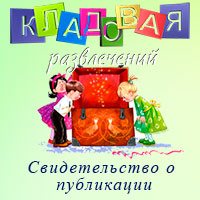Конспект урока английского языка по теме: Камчатский гигантский медведь
Урок английского языка по теме: “Kamchatka’S Gentle. Giants”
Цель: формирование представления учащихся и взрослых о гигантском камчатском медведе;Задачи:
познакомить учащихся с особенностями камчатского медведя;
закрепить с помощью специальных упражнений лексический запас по теме;
воспитывать интерес к гигантским животным,
вызвать желание у учащихся узнать как можно больше информации о гигантских камчатских медведях.
Пояснительная записка:
В учебнике Ю.Е.Ваулиной за пятый класс есть раздел в конце учебника о нашей стране. Одна из частей раздела посвящена камчатским медведям. В уроке показана работа по тексту, приёмы освоения лексики, методы закрепления лексического материала по теме, проводится интересная сюжетно – ролевая игра: « Корреспонденты». Используется хороший текст для знакомства с камчатским медведем. Я в работе использую слайды, это поможет более эффективно усвоить материала. Для отработки звуков использую рисунки с графическими изображениями. А после этого использую фонетическую отработку этих же слов. Так учащиеся лучше запоминают произношение слов.Ход урока:
1. Вступительное слово учителя.
My dear students! There are many wonderful places to live in Russia. One of them – is Kamchatka. There are many forests, lakes, beautiful rivers and animals in Kamchatka. Bears there are the biggest in the world.So, what do you think, what are we going to speak about? What is the aim of our lesson?
2. Ответы учеников.
3. Работа по тексту домашнего задания.
Kamchatka brown bear is one of the largest land predators and the largest bear in the world. Impress even the average local clubfoot: from 350 to 400 pounds.Bears can easily outrun a horse autumn high diet weight individuals may reach 700 pounds. These dimensions have been able to maintain thanks to a strict diet of fish – salmon. Adult large male, accumulating winter fat can eat per day to 100 kilograms of salmon. Bears have many ways of catching fish – "touch", jump – darting into the water from shore, forcing the prey in shallow water, or just standing in the middle of the river and head down into the water.
Salmon is the main but not the only food of the Kamchatka bears. The river is not always full of fish, so a few months of the year these huge predators eat only berries and nuts.
Every bear inhabits a large territory, which he guards against alien attacks. Once a year Bears leave their homes and gather in the floodplains of rivers and lakes, which are spawning salmon. While often they have to go through a thousand or more kilometers.
The way they find unmistakably and effortlessly. Kamchatka brown bears are easily oriented in space. There were cases when a particularly dangerous or too curious, the animals were tranquilized and transported by helicopter away from people thousands of miles away. After a while they came back.
Kamchatka bears are very strong and hardy. They can teeth to chew any bone to roll huge boulders to climb sheer cliffs to sit for hours in the icy water. Bears are good swimmers. They have great coordination and quick movements. Dry land for short distances they can easily outrun a horse, but quickly run out of steam, if you have to run long. Bears have excellent senses of smell and hearing.
The Kamchatka Peninsula is one of the last parts of Russia where to feel at ease animals. Every sixth bear of our country lives here.
Bears eat salmon
a) Questions:
Was the text difficult for you? What parts of the text you didn’t understand?
Did you use the dictionary while translating?
b) Систематизация английских слов из текста по их звучанию, отработка чтения новых слов из текста:






[ai]
Climb, dry.


[i:]
Reach, been, feel.
4. Phonetic drill. Фонетическая отработка слов:
largest, large, hardy, part, darting, horse, forcing, effortlessly, transport, coordination, fat, catch, standing, salmon, gather, dangerous, back, land,
clubfoot, jump, month, nuts, eat, reach, been, feel, thousand, climb, dry, predator, maintain, accumulate, way, main, came.
5. Работа с новым словом: “Predator”.



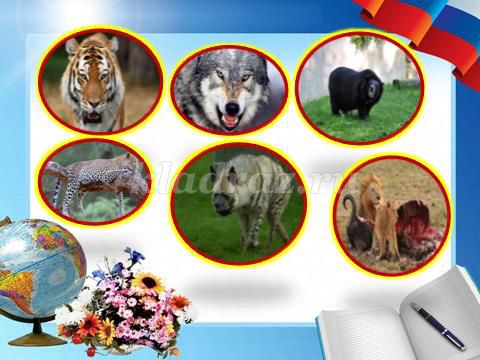
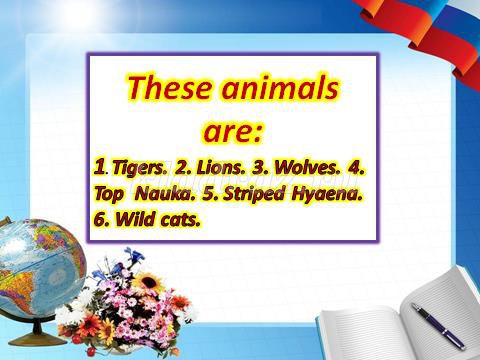

a) Каждый медведь населяет огромную территорию.
b) Лосось – главная еда медведей, но далеко не единственная для камчатских медведей.
с) В реке не всегда много рыбы, таким образом, несколько месяцев эти огромные хищники едят только ягоды и орехи.
7. Choose the correct answer:
Bears can swim very well because:
a) they have good speed and quick movements;
b) they gather in the floodplains of rivers.
Kamchatka bears are the largest in the world because:
a) their weight is 700 pounds;
b) they can outrun a horse.
8. Match adjectives and nouns from the text:

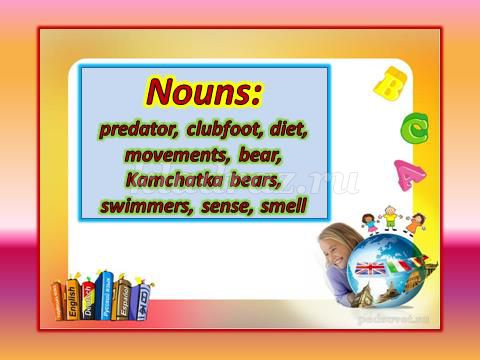


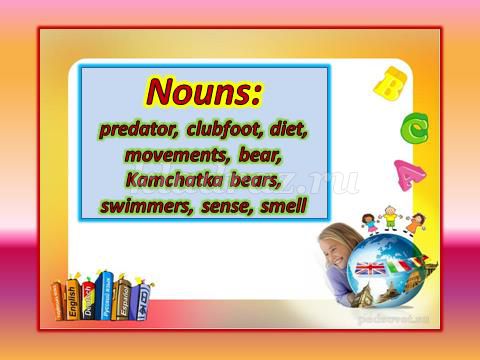

a) What is a Kamchatka brown bear?
b) How do bears catch fish?
c) What is their favorite food?
d) Where do they live in Kamchatka?
e) How do they orient in space?
f) Why are they good swimmers?
11. Показ слайдов.
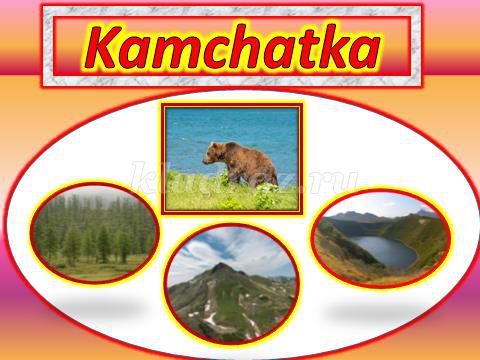
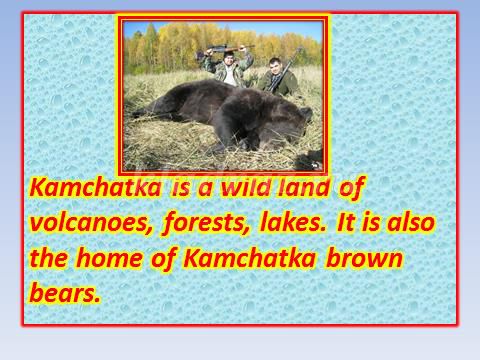

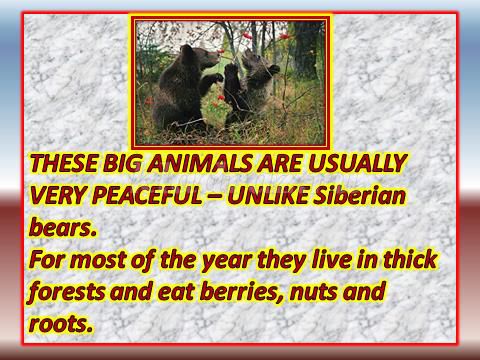
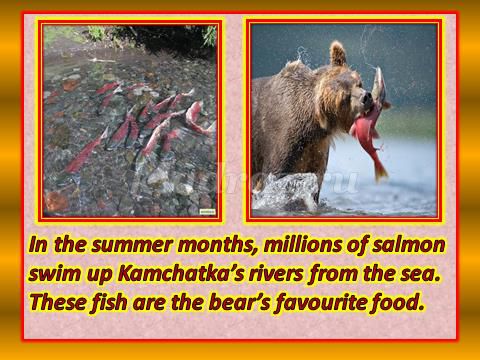
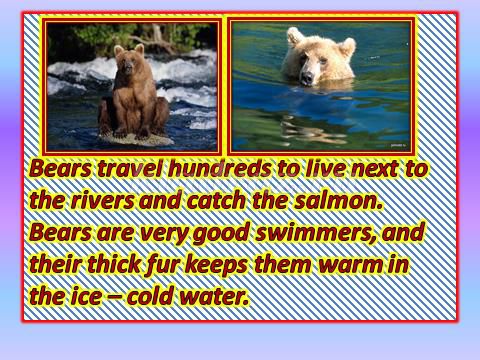
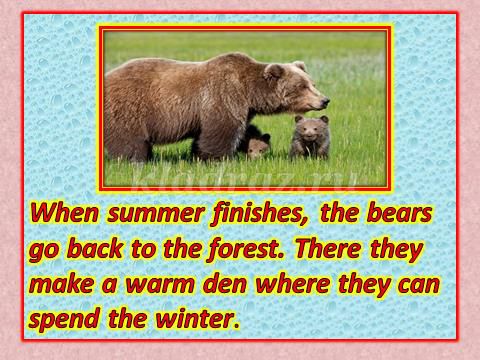
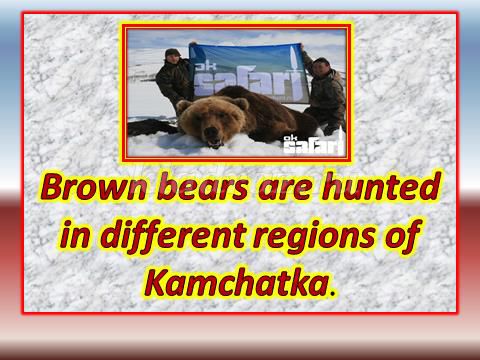
a) Kamchatka brown bear is one of the largest land predators in the world;
b) Bears have many ways of catching fish;
c) Their favorite food is salmon.
d) They can eat berries and nuts;
e) They are very strong and hardyж
f) Bears can hear very well;
h) Bears have a good sense of smell.
13. Ответ на вопрос: What have you learned from the text?
(Ученики раскрывают содержание текста, используя ключевые предложения)
14. Сюжетно – ролевая игра: «Корреспонденты»
a) Один из учащихся является учёным, специалистом в области изучения камчатских медведей;b) Другие учащиеся являются корреспондентами разных газет и задают учёному вопросы о камчатских медведях. Идёт телепередача.
c) Ведущий:
“Dear ladies and gentlemen! Our program today is devoted to Kamchatka bears – the largest bears in the world. Let me introduce our quests:
“Mr. Vinogradov is a great specialist in the field pf investigation of brown Kamchatka bears. Our guests today are correspondents of different Russian newspapers. They are going to ask different questions about Kamchatka bears”.
c) Questions:
Pupil 1:
Let me introduce myself. My name is Nikitina Tatyana. I am the correspondent of the newspaper: “Moscow News”. So, my question is:
What territory of Kamchatka do the brown bears inhabit?
Pupil 2:
Let me introduce myself. My name is Vladislav Chechov. I am the correspondent of the newspaper: “Arguments and facts”. So, my question is:
What do brown bears eat?
И т.д.
15. Краткий пересказ текста.
16. Подведение итогов урока.
Рекомендуем посмотреть:
 Спортивно-интеллектуальная игра по английскому языку. Сценарий для 5-7 классов
Спортивно-интеллектуальная игра по английскому языку. Сценарий для 5-7 классов
 Интеллектуальная игра по английскому языку для 2 класса
Интеллектуальная игра по английскому языку для 2 класса
 Формирование мотивации к обучению иностранному языку
Формирование мотивации к обучению иностранному языку
 Конспекты уроков по английскому языку по теме: Традиции и обычаи, 7 класс
Конспекты уроков по английскому языку по теме: Традиции и обычаи, 7 класс
|
|
+13↑ Голосов: 13 |
| 11 июля 2016 в 08:00 +5 | ||
|
| 11 июля 2016 в 12:57 +4 | ||
|
| 11 июля 2016 в 13:46 +4 | ||
|
| 11 июля 2016 в 19:01 +5 | ||
|
| 11 июля 2016 в 20:06 +1 | ||
|
| 11 июля 2016 в 21:07 +2 | ||
|
| 11 июля 2016 в 22:43 0 | ||
|
| 12 июля 2016 в 12:17 +2 |
| Уважаемая Татьяна Михайловна, я с удовольствием ознакомилась с Вашей работой. Понравилось все:и то, как вы с детьми работали над текстом,особенно 'конференция',и работа со звуками ( я тоже пользуюсь карточками), и изобилие иллюстративного материала.Такой урок обречен на успех. Спасибо! |
| 13 июля 2016 в 13:01 +3 | ||
|


